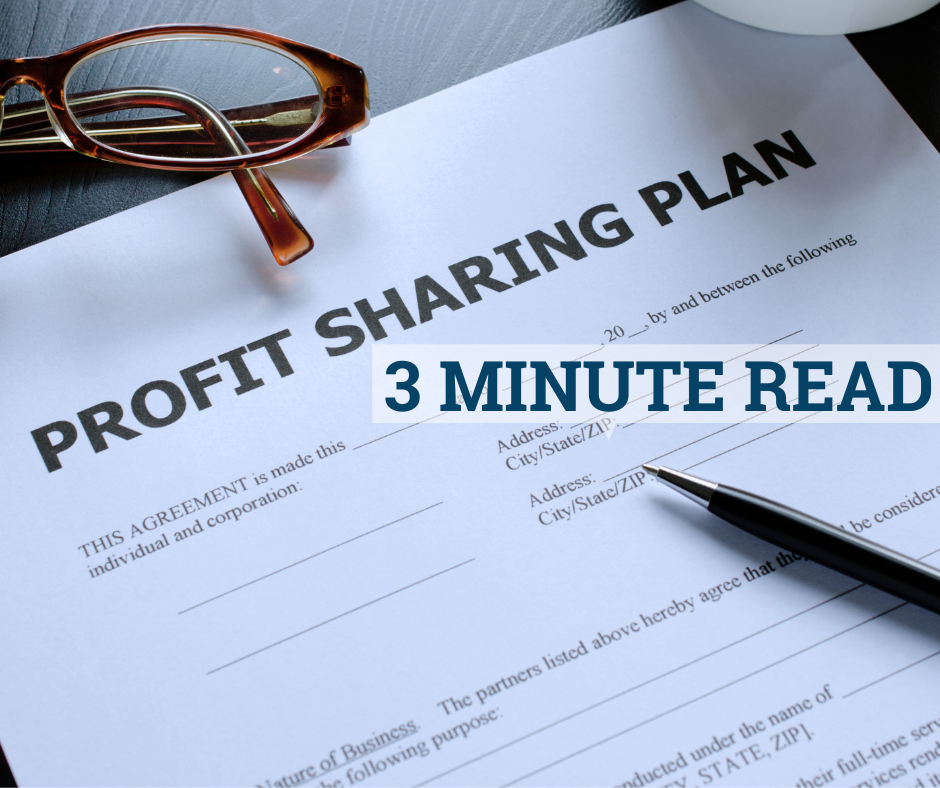

After a great year, giving back to your employees can be very beneficial for your business. Indeed states, “employees with incomes directly proportional to the organization’s profit generally become more invested in its future success and stay with the company longer.” A profit-sharing plan is one way to use your business’ financial success to benefit you and your employees.
Profit sharing and 401(k) plans go hand in hand. When you offer your employees a 401(k) plan, you can choose to include a profit-sharing provision. These provisions are typically discretionary, giving you the flexibility to decide whether to contribute to your employees' profit sharing at the end of the fiscal year.
If you have a particularly good year, you can use some of that profit to make contributions to your employees. These contributions only take place after the end of a year so that you have the annual figures to determine what people made and the overall profitability of your business.
Despite its name, profit sharing is not based on the profitability of a company. A profit-sharing plan allows you to take excess money after the end of a fiscal year and distribute it to employees’ retirement plans. These contributions typically come as set percentages applied to each employee’s salary.
It’s important to note that these payments are not cash bonuses. Profit-sharing payments are deposited to employees’ individual 401(k) accounts as a separate line item from employee contributions. If an employee doesn’t participate in a 401(k) but is eligible to receive profit sharing, an account is automatically created for that employee.
Another key aspect of a profit-sharing plan is that contributions are made to all eligible employees. You determine these eligibility requirements when you set up the plan. This could mean immediate eligibility for everyone from day one, or you might set a waiting period of up to one year.
There are several types of profit-sharing plans, including:
There are several good reasons to consider making a profit-sharing contribution after a successful year. One major advantage is that profit-sharing contributions aren’t considered payroll items. If you've had a fantastic year and want to reward your employees while saving on taxes, profit sharing allows you to contribute without paying payroll taxes. This means you won't have to pay into Social Security or Medicare, maximizing your contribution's value and reducing your tax burden. Additionally, you can also claim a tax write-off on these contributions, further enhancing your savings.
Because profit sharing is linked to company profitability, it contributes to your business’s financial stability. Unlike a fixed bonus, you aren’t required to provide a standard amount each year and can instead offer variable amounts based on what your business can afford.
Another advantage of profit sharing is that it’s an attractive tool to recruit and retain employees. In an increasingly competitive workplace, it’s an extra bonus that makes your business appealing to potential team members. For existing employees, it links their performance to the success of your business, which boosts morale and motivation to remain with the company for longer periods of time.
Profit sharing is another way to reward employees after a successful year by contributing additional funds toward their retirement. You can also attach a vesting schedule to that profit-sharing contribution to incentivize employees to stay with your company.
For example, you could place a six-year vesting schedule for profit-sharing contributions. Employees receiving those funds must be at your company for six years to keep all of the money. Employees who leave after two years are only partially vested in that contribution. This gives your employees an added incentive to stay at your company.
Like a 401(k), there are certain rules and regulations that you must abide by when managing a profit-sharing plan. A professional employer organization (PEO) like GMS can help you manage the legal responsibilities associated with these benefits as well as determine what allocation models you can choose. Contact GMS today to talk to one of our experts about 401(k) and profit sharing.